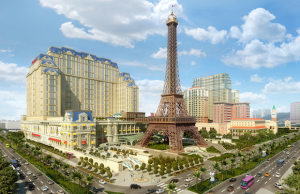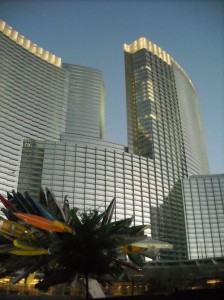That “squish” you heard from across the sea was Macao‘s gaming market reporting a decrease of 21% last month, practically good news when  measured against November’s 32% plunge. Mind you, Macanese casinos were averaging $74 million in win per day, so the six concessionaires are crying all the way to the bank. To put it in a historical context, this is the lowest Macao revenues have been since 2010.
measured against November’s 32% plunge. Mind you, Macanese casinos were averaging $74 million in win per day, so the six concessionaires are crying all the way to the bank. To put it in a historical context, this is the lowest Macao revenues have been since 2010.
As luck would have it, two resorts — Studio City and Sheldon Adelson‘s St. Regis — have just opened and three megaaresorts are scheduled for this year, starting with Wynn Palace in June and ending with MGM Cotai, probably to be rolled out in December. Union Gaming Group‘s Grant Govertson predicts things will get worse before they get better, writing, “We continue to believe that [VIP play] will face an even tougher 2016 than 2015. Our estimates contemplate continued demand weakness, which will likely be exacerbated by pressures on the regulatory front and on the operational front.”
While MGM Resorts International, Wynn Resorts and Sands China aren’t going to get rich quick on their new pleasure palaces, Fitch Ratings‘ Alex Bumazhny predicts a stabilization of revenue this year and “we’re starting to see its long-term potential on the horizon.” The real breakthrough, he believes, will come around 2018-19, when new infrastructure programs in China are completed, widening access to the gambling enclave. Meanwhile, as VIP play remains hard to come by, are government limitations on table game allocations that big a problem?
* Gaming analysts need to accept that 2007’s $11 billion in gaming revenue was an economic aberration and get on with life. As the Las Vegas Convention & Visitors Authority reports, Vegas visitors have been  staying shorter since 2009 and, while they’re gambling less, they’re spending bigger on dining, nightclubs and shows. In 2015 — another record-breaking year for visitation — non-gaming revenue outstripped gambling win by $480 million. “More visitors per room, per week, per month, per year. It’s like turning tables at a restaurant,” LVCVA analyst Scott Russell says.
staying shorter since 2009 and, while they’re gambling less, they’re spending bigger on dining, nightclubs and shows. In 2015 — another record-breaking year for visitation — non-gaming revenue outstripped gambling win by $480 million. “More visitors per room, per week, per month, per year. It’s like turning tables at a restaurant,” LVCVA analyst Scott Russell says.
According to gaming analyst Jonathan Galaviz, eight years after the bubble popped Las Vegas is still in “strategic recovery mode.” Unfortunately, his Mr. Fix-It solution is the tried-and-untrue method of another wave of megaresorts. Applied Analysis‘ Jeremy Aguero expands on Galaviz’s thesis by saying that the casino industry has been adding hotel rooms without bringing in new attractions, too. In other words, the Vegas High Roller isn’t cutting it. According to Vegas Inc., “He said record visitation and signs of improvement would only be better if it came with record room rates and gambling revenue, too.” Sheesh! It’s that the same avaricious mentality that got us so deeply mired in the Great Recession?
* A new smoking ban in Hancock County took a huge bite out of profits at Mountaineer Casino, Racetrack & Resort, where net income dropped 30%. This is despite Mountaineer’s provision of a 200-slot, open-air pavilion, which has evidently proven so popular that 45 machines are being added. However, owner Eldorado Resorts is cutting back elsewhere, shortening its horseracing season from 210 dates to 160. So much for slot machines being the salvation of the horsey set.
